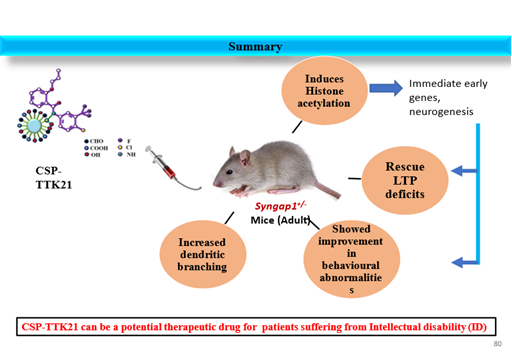Context:
A groundbreaking study by researchers at the Jawaharlal Nehru Centre for Advanced Scientific Research (JNCASR) has identified a promising new therapy for autism spectrum disorder (ASD) and intellectual disability (ID). This innovative approach focuses on epigenetic modifications to restore cognitive function and enhance independence in individuals affected by these conditions.
The Science behind the Therapy
The research explored the role of epigenetic modifications in ASD. The research team studied mice with a mutated Syngap1 gene (Syngap1+/- mice), which mirrors mutations observed in autistic individuals.
· They discovered that these mice exhibited repressed acetylation of DNA-associated proteins, a crucial process for brain development and function.
· The enzyme KAT3B (p300) was identified as responsible for this acetylation. To counteract the deficiency, the researchers developed an activator, TTK21, which stimulates the enzyme's activity, potentially reversing the cognitive impairments associated with ASD/ID.
The Role of the Syngap1 Gene in Autism
The Syngap1 gene plays a vital role in brain function, particularly in learning, memory, and social interaction. Mutations in this gene are linked to autism and intellectual disabilities, leading to significant cognitive and behavioral challenges.
· How the Therapy Works: The therapy employs TTK21, a molecule designed to activate KAT3B (p300), an enzyme responsible for acetylating DNA-associated proteins (histones). These proteins provide structural support for chromosomes and regulate gene expression.
· To ensure effective delivery, TTK21 was conjugated with glucose-derived nanospheres (CSP-TTK21) and administered to the mutant mice. This resulted in increased acetylation in the brain, leading to the restoration of neuronal function, learning, memory, and even neuronal rearrangements—key improvements for cognitive abilities.
About Autism Spectrum Disorder (ASD)
Autism spectrum disorder (ASD) is a complex developmental condition that affects social behavior, communication, and language. It is characterized by a restricted range of interests and repetitive behaviors, which vary from person to person. Symptoms typically become noticeable within the first three years of life.
Causes of ASD
While the exact cause of ASD remains unclear, researchers believe it results from a combination of genetic and environmental factors. Ongoing studies aim to pinpoint the precise causes and contributing factors.
Common Signs and Symptoms of ASD
- Difficulties in social communication and interaction
- Restricted or highly specific interests
- Repetitive behaviors (e.g., repeating actions, rituals)
Conclusion
This pioneering research marks a significant advancement in ASD/ID therapy by leveraging epigenetic modifications. The findings suggest that CSP-TTK21 holds promise as a potential treatment for restoring cognitive function and fostering independence in individuals with ASD/ID. However, further studies and human clinical trials are essential to assess the long-term safety and efficacy of this innovative approach.









